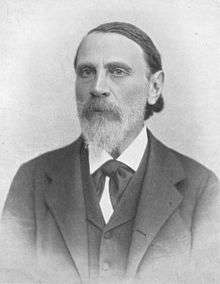Moritz Benedikt

Moritz Benedikt (4 July 1835, Eisenstadt, Sopron County – 14 April 1920, Vienna) was a Hungarian-Austrian neurologist who was a native of Eisenstadt.
He was an instructor and professor of neurology at the University of Vienna. Benedikt was a physician with the Austrian army during the Second Italian War of Independence (1859) and the Austro-Prussian War.
Benedikt was a specialist in the fields of electrotherapeutics and neuropathology. His name is lent to the eponymous "Benedikt's syndrome", a disease characterized by ipsilateral oculomotor paralysis with contralateral tremor and hemiparesis caused by a lesion involving the red nucleus and corticospinal tract in the midbrain tegmentum.
Benedikt is remembered today for his controversial research in criminal anthropology. He performed numerous cephalometric studies, and postulated that there were specific differences between "normal" and "criminal brains". He explained his research on the subject in a book titled "Anatomical Studies upon the Brains of Criminals" (title of English translation).
Benedikt is credited for coining the word "darsonvalisation" to describe therapeutic or experimental applications of high frequency. Darsonvalisation was named in honor of French biophysicist Jacques-Arsène d'Arsonval (1851–1940).
Publications
- Moriz Benedikt: Die psychologischen Funktionen des Gehirnes in gesundem und kranker Zustand, Wiener Klinik: Vorträge; Jg. 1, H. 7, Wien, 1875
- Moriz Benedikt: Zur Lehre von der Localisation der Gehirnfunctionen, Wiener Klinik: Vorträge; Jg. 9, H. 5-6, Vienna, 1875
- Moriz Benedikt: Ueber Katalepsie und Mesmerismus, Wiener Klinik: Vorträge; Jg. 6, H. 3/4, Vienna, 1880
- Moriz Benedikt: Ueber Elektricität in der Medicin, Wiener Klinik: Vorträge; Jg. 10, H. 2, Vienna, 1884
- Moriz Benedikt: Grundformeln des neuropathologischen Denkens, Wiener Klinik: Vorträge; Jg. 11, H. 4, Vienna, 1885
- Moriz Benedikt: Hypnotismus und Suggestion, Breitenstein, Leipzig, 1894
- Moriz Benedikt: Seelenkunde des Menschen als reine Erfahrungswissenschaft, Reisland, Leipzig, 1895
- Moriz Benedikt: Krystallisation und Morphogenesis, Perles, Vienna, 1904
- Moriz Benedikt: Aus meinem Leben: Erinnerungen und Erörterungen, Konegen, Vienna, 1906
- Moriz Benedikt: Biomechanik und Biogenesis, Fischer, Jena, 1912
- Moriz Benedikt: Die latenten (Reichenbach'schen) Emanationen der Chemikalien, Konegen, Vienna, 1915
- Moriz Benedikt: Leitfaden der Rutenlehre (Wünschelrute), Urban & Schwarzenberg, Vienna, 1916
- Moriz Benedikt: Ruten- und Pendellehre, Hartleben, Vienna, 1917
References
- Moritz Benedikt’s Localization of Morality in the Occipital Lobes
- Short Biography of Moritz Benedikt
- Darsonalisation @ Who Named It
- Moriz Benedikt (1906). Aus meinem Leben. C. Konegen., Dr Moritz Benedikt, Verlagsbuchhandlung Carl Konegen, Vienna, 1906.